Department of English
Undergraduate Course Descriptions
Summer 2026
The English Department also offers online and in-person sections of ENGL 1010, 1020, 2201, and 2202 in first, second, and full summer terms. Please check the dynamic schedule for a full list of summer 2026 course offerings.
First Half Term
ENGL 3327 - American Lit to 1865 | Dr. Christopher Black | MTWRF 10:50-12:30pm
Survey of major authors, themes, and movements in American literature from the colonial
period through 1865.
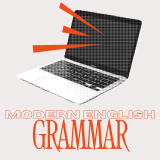 ENGL 3501 - Modern English Grammar | Dr. Lindsay Helms | Online
ENGL 3501 - Modern English Grammar | Dr. Lindsay Helms | Online
In this class we will examine the structure of the English language with a focus on
syntax, morphology, and the lexicon. We will consider different Englishes and how
English grammar varies within and across communities. Our approach will be primarily
descriptive (i.e. focused on how grammar is used, not how it should be used), but
we will also discuss grammar in relation to context and the peculiarities of standard
and academic language. Students in this class will analyze a variety of syntactic
structures and be able to identify common learner errors, differences in dialects
and varieties, and hypercorrections. Students will be able to effectively use metalanguage
to describe and analyze English grammar.
ENGL 3601 - Intro to Technical & Professional Writing | Dr. Chloe Robertson | Online
Introduction to rhetoric and style of documents written by scientists, engineers,
technical writers, and other professionals; extensive practice in writing reports,
proposals, manuals, and correspondence.
ENGL 3603 - Engineering Communication | Dr. Scott Sundvall | MTWRF 10:50-12:30pm
Form and contexts of written and oral communications in engineering professions; extensive
practice in oral reporting, written reports, manuals, and proposals. Does not apply to the English major or minor.
Second Half Term
ENGL 3326 - AfAm Lit Since the Harlem Renaissance | Prof. Kim Payne | Online
Examination of African American literary tradition from the Harlem Renaissance to
the present; Chicago writers, integrationist aesthetics of the 1950’s; black aesthetics
of the 1960’s.
ENGL 3604 - Persuasive Writing | Prof. Terry Ansbro | Online
Study and practice of writing essays and reports with emphasis on persuasion; introduction
to empirical and library research, application of rhetorical principles, and nature
of evidence, including numerical; academic and professional writing, editing, and
revision.
ENGL 3607 - Fiction Writing | Dr. Eric Schlich | MTWRF 8:55-10:35am
Exploration of the creative process within the forms and traditions of fiction. Emphasis
on the student’s own work.
ENGL 4531 - Methods & Techniques in ESL | Prof. Tammy Jones | Online
Methods and techniques of teaching English as a Second Language in various settings.
Spring 2026
Need more info?
For the most up-to-date list of classes offered, visit the dynamic schedule. For questions about classes, consult our undergraduate advising page or contact the listed instructor. To see what we'll be offering in future semesters,
visit our two-year course rotation template. Interested in studying literature, taking a writing workshop, improving your writing
skills, or brushing up your teaching skills, but don't want to pursue a degree? You
should apply as a Non-Degree Seeking Student.
Jump to:
- African American Literature Courses
- Applied Linguistics/TESOL Courses
- Creative Writing Courses
- Literature Courses
- Professional Writing Courses
- Honors & Internships
Click on each course title to read the professor's full course description; click on each thumbnail image to view the course flyer.
General Education Requirements:
ENGL 1010 - English Composition (multiple sections; online courses available)
Practice in expository writing with emphasis on content, organization, and style (levels
of usage and sentence structure) for different purposes and audiences.
ENGL 1020 - English Composition/Analysis (multiple sections; online courses available)
Practice in expository writing that synthesizes ideas from various readings. Includes
library work and production of documented papers.
ENGL 2201 - Literary Heritage (multiple sections; online courses available)
Major texts of literary heritage; modes of literary expression and cultural context;
emphasis on works as products of their historical contexts and as processes shaping
human consciousness.
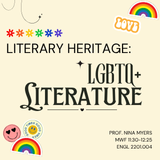 2201.004 - Literary Heritage: LGBTQ+ Literature | Prof. Nina Myers | MWF 11:30-12:25
2201.004 - Literary Heritage: LGBTQ+ Literature | Prof. Nina Myers | MWF 11:30-12:25
In this section of Literary Heritage, we will read texts representing the literary
modes of fiction, poetry, drama, and memoir with a focus on LGBTQ Literature. This
class offers a space to engage with texts by Southern and Filipino/a/x American writers
in an effort to explore gender identity and sexuality as they relate to both familiar
and culturally distinct literary contexts. This course asks students to use various
literary criticism models (LGBTQ critical theory, Feminist, Cultural, New Historicism,
etc.) as lenses.
2201.007 - Literary Heritage: Creative Writing | TBA | MW 12:40-2:05pm
2201.016 - Literary Heritage: Creative Writing | TBA | TR 1:00-2:25pm
ENGL 2202 - Literary Heritage: African American Literature (multiple sections; online
courses available)
Consideration of major texts of literary heritage with emphasis on African-American
culture; modes of literary expression and cultural context; emphasis on work as products
of historical contexts and as processes shaping human consciousness.
African American Literature:
ENGL 3325 - AfAm Lit Through the Harlem Renaissance | Dr. Verner Mitchell | Online
Examination of works by black authors starting with the Colonial Enlightenment, continuing
with slave narratives, and ending with the rise of the black novel.
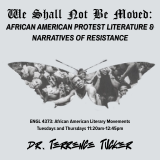 ENGL 4373 - We Shall Not Be Moved: African American Protest Literature and Narratives
of Resistance | Dr. Terrence Tucker | TR 11:20-12:45
ENGL 4373 - We Shall Not Be Moved: African American Protest Literature and Narratives
of Resistance | Dr. Terrence Tucker | TR 11:20-12:45
Using text from various time periods, we will examine how African-American authors
construct acts of resistance takes place across political, literary, and historical
cycles such as Jim Crow, the Civil Rights and Black Power Movements, and into the
21st century. Acts of resistance in the works vary from the conservative to the militant,
often contradicting other efforts and causing tensions within African America. In
particular, this course will trace the expansion and maturation of African American
literature over the last thirty years. Influenced by the protest novels of the 1940s
and 1950s and emerging alongside the rapidly changing social, political, and economic
landscapes of post-Civil Rights America, we will chronicle an impressive array of
new, young voices that not only reflect the lives of African Americans since 2008,
while interrogating how external and internal forces and structures impact the lives
the authors depict in unique ways. Contemporary African American literature has been
influenced most directly by Black Lives Matter, social media and the digital revolution,
hip-hop music, and the remigration to the South and its impact on the last few presidential
elections. This class will unfold through several units, as we move from classic “literary”
fiction to popular “street lit” to episodes of Star Trek: Deep Space Nine. By viewing the combination of these cycles, we will view these works to see how
the authors negotiate their characters through the minefields of race, gender, and
class to resist the forces that seek to deny their humanity. May be repeated for maximum of 6 hours credit with change in course content.
Applied Linguistics/TESOL:
ENGL 3501 - Modern English Grammar | TBA | Online
Introduction to current grammatical theory; description of sounds, word structures,
syntax, and semantics of English within theoretical frameworks.
ENGL 3511 - Intro to Linguistics | TBA | MW 12:40-2:05
Introduction to the nature and functions of human language, to its structural principles,
and to its place in culture and society; emphasis on language diversity and change
through history and contact; discussion of language and thought, origin of language,
and other topics.
ENGL 4531.M50 and M51 - Methods & Techniques in ESL | Prof. Tammy Jones | Online
Approaches to working with ESL or EFL students in multicultural settings.
ENGL 4532 - Skills/App/Assessment in ESL | TBA | Online
Approaches to evaluation and means of assessment of language skills, with special
emphasis on English as a Second Language
Creative Writing:
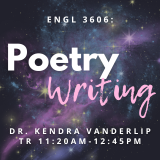 ENGL 3606.002 - Poetry Writing | Dr. Kendra Vanderlip | TR 11:20-12:45
ENGL 3606.002 - Poetry Writing | Dr. Kendra Vanderlip | TR 11:20-12:45
Calling all poets! ENGL 3606 is an introductory class for anyone who wants to learn
more about writing and reading poetry. Students will learn the conventions of the
genre through close reading, analysis, creative practice, and constructive critique
studying contemporary selections of poetry to analyze the use of style, structure,
and figurative language. We will compose poems throughout the semester with guided
prompts, culminating in a portfolio at the end of the semester showcasing the writer’s
growth and understanding of poetic conventions.
ENGL 3607.001 - Fiction Writing | TBA | MWF 10:20-11:15
Exploration of the creative process within the forms and traditions of fiction. Emphasis
on the student’s own work.
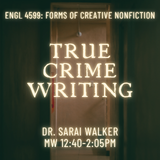 ENGL 4599 - Forms of Creative Nonfiction | Dr. Sarai Walker | MW 12:40-2:05
ENGL 4599 - Forms of Creative Nonfiction | Dr. Sarai Walker | MW 12:40-2:05
This class will examine the genre of true crime through the lens of creative non-fiction.
We will look at a variety of forms, including the non-fiction novel, essays, cultural
criticism, magazine articles and memoir, as well as podcasts and documentaries. Topics
of discussion will include the ethics of true crime writing, approaches to writing
about violent and disturbing events, and writing responsibly about victims and survivors
of crime. Students will engage in short writing exercises, have the chance to research
and discuss cases that interest them, and write their own creative non-fiction piece
to be workshopped. We will read In Cold Blood by Truman Capote, Savage Appetites by Rachel Monroe, The Evidence of Things Not Seen by James Baldwin and more.
 ENGL 4601 - Poetry Workshop | Dr. Kendra Vanderlip | TR 1:00-2:25
ENGL 4601 - Poetry Workshop | Dr. Kendra Vanderlip | TR 1:00-2:25
This course places heavy emphasis on workshop and reading in preparation for workshop.
The theme of this workshop class will revolve around the ekphrastic poem (poems about
art). We will be taking a look at several ekphrastic poetry collections and considering
our own compositions inspired by art, both physical and in media form. Workshops will
focus on developing content in conversation with the larger goals of the project,
and how theme, craft and voice all work in conversation with one another while composing.
Students will build their writer toolkit through class discussion and analysis, equipping
students with a detailed understanding of the craft of literary poetry writing.
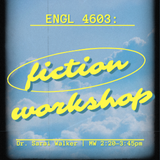 ENGL 4603 - Fiction Workshop | Dr. Sarai Walker | MW 2:20-3:45
ENGL 4603 - Fiction Workshop | Dr. Sarai Walker | MW 2:20-3:45
This is an upper-level undergraduate fiction workshop focusing on students’ own original
writing and the analysis of published short stories and novels. Building on skills
developed in ENGL 3607 or ENGL 3608, students will further develop their use of literary
technique, focusing on language, character, dialogue, setting, plot, point of view,
structure and more. Throughout the semester, we will examine different genres of fiction
writing, such as literary fiction, horror, science fiction and fantasy, speculative
fiction, mystery and suspense, Westerns, romance and more by reading and discussing
a wide variety of stories. This workshop is a supportive environment where students
can share their work and grow as writers.
Literature:
ENGL 3210 - British Literature to 1750 | Multiple sections offered, online and honors
available
Survey of major authors, themes, and movements from the medieval period through the
18th century.
3210.001 | Dr. Dean Clement | MWF 11:30-12:25
3210.002 | Dr. Josh Phillips | TR 11:20-12:45
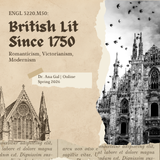 ENGL 3220.M50 | Dr. Grace Gal | Online
ENGL 3220.M50 | Dr. Grace Gal | Online
In this survey course, we will read, analyze, and deconstruct some of the most influential
works in British literature from three major literary periods – Romanticism, Victorianism,
Modernism, and beyond. In particular, we will critically explore how British writers
have defined and conceptualized what it means to be “British,” both at home and abroad,
since the late eighteenth century, and how this national identity – along with ideas
of gender, class, race, and ethnicity – has shifted under the pressures of industrialization,
urbanization, and globalization. By engaging with these texts both as foundational
literary works and as constructs open to critique, we will consider how their authority
has been upheld, challenged, and reinterpreted over time.
ENGL 3327.001 - American Literature to 1865 | Dr. Theron Britt | TR 1:00-2:25
This course will trace through a variety of literary and cultural documents the development
of American literature from the beginnings of European settlement up to the second
half of the 19th century. We will examine how American writers, faced with the prospect of inventing
new ways to understand and represent a new and quickly changing social order, constructed,
critiqued, and then constantly revised competing ideas of “America” and American identity.
We will begin with colonial settlement and then explore a large body of literature
that includes the Puritans, the European engagement with America’s first “others”—Native
Americans—the American Revolution, the American Transcendentalists, issues of slavery
and race, and mid-19th century American Realism.
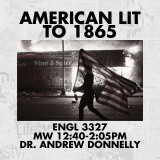 3327.002/350 - American Literature to 1865 *honors embedded* | Dr. Andrew Donnelly
| MW 12:40-2:25
3327.002/350 - American Literature to 1865 *honors embedded* | Dr. Andrew Donnelly
| MW 12:40-2:25
At the 250th anniversary of American independence, the nature of American identity
as well as the goals of the American national experiment remain deeply contested.
These contested ideas—about freedom, citizenship, rights, economic opportunity, and
shared values—often refer back to the moment of the nation's founding. This course
explores the literature of that moment, from the European colonization of the New
World through the Civil War. We will examine imaginative literature, activist arguments,
political documents, and other cultural artifacts in order to understand the history
and legacy of colonization, the writing of the U.S. Constitution, slavery, expansionism,
'Manifest Destiny,', the abolitionist movement, and the Civil War. What, the course
asks, is the meaning of American identity then and now?
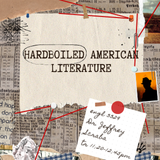 ENGL 3329 - Major Authors in American Lit: Hardboiled! | Dr. Jeffrey Scraba | TR 11:20-12:45
ENGL 3329 - Major Authors in American Lit: Hardboiled! | Dr. Jeffrey Scraba | TR 11:20-12:45
Through close consideration of five vital 20th-century American authors—Dashiell Hammett,
James M. Cain, Raymond Chandler, Patricia Highsmith, and Chester Himes—and selected
film adaptations of their work, we will examine the distinctly American genre of hardboiled
crime fiction from its beginnings in the pulp magazines of the 1920s through the complex
noir fiction of the 1950s and 1960s. The first objective of the course is to study
the emergence and codification of genre: we will explore how a new type of literary
work comes into existence by adapting older forms, how the implicit rules of this
new genre become established, and how writers experiment with these new rules. The
second objective of the course is to study this fiction as a response to and reflection
of historical conditions: with particular attention to the ways in which these novels
work through problems of race, gender, class, and sexuality, we will investigate how
they reflect American culture in the middle decades of the twentieth century. May be repeated for a maximum of 6 hours credit with change in course content.
ENGL 3401 - Children's Literature | Prof. Cathy Dice | MWF 10:20-11:15
Study of children’s literature through reading, discussion, and writing about history,
characteristics, and authors of its major genres
ENGL 3403 - Mythic Backgrounds in Lit | Dr. Joshua Phillips | TR 9:40-11:05
Study of Middle Eastern and Greek mythology and their development from Homer, Plato,
and Ovid and continuing through Milton; extensive practice in critical thinking, written
exposition, methods for source study, and mythic, literary, and cultural analysis.
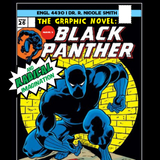 ENGL 4430 - Graphic Novel: Marvel's Black Panther and Radical Imagination | Dr. R. Nicole Smith | MWF 11:30-12:25
ENGL 4430 - Graphic Novel: Marvel's Black Panther and Radical Imagination | Dr. R. Nicole Smith | MWF 11:30-12:25
Students will engage selected volumes of Black Panther graphic novels written by a
variety of Black authors including Christopher Priest, Ronald Hudlin, Ta-Nahesi Coates,
Nnedi Okorafor, and Karama Horne. Students will then examine how origin stories and
representations of heroes and heroines originating from the African diaspora interrupt
commonly held beliefs about who qualifies to be a superhero or superheroine.
Professional Writing:
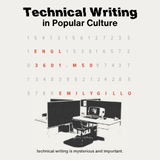 3601.M50: Tech Writing in Popular Culture | Prof. Emily Gillo | Online
3601.M50: Tech Writing in Popular Culture | Prof. Emily Gillo | Online
This section of Technical & Professional Writing explores how professional and technical
communication shapes (and hides within) popular media and culture. From the onboarding
manuals of dystopian corporations to the disclaimers in viral TikTok trends to the
AI “slopification” of certain social platforms, we’ll uncover how technical communication
informs stories, interfaces, and social platforms. Through three major projects that
blend audience analysis, critical literacy, multimodal design, and ethical considerations,
we’ll focus on writing and designing clear, accessible, and ethical documents and
projects that work across audiences, platforms, and technologies.
ENGL 3601.M51 - Intro to Technical & Professional Writing | Prof. Terry Ansbro | Online
Introduction to rhetoric and style of documents written by scientists, engineers,
technical writers, and other professionals; extensive practice in writing reports,
proposals, manuals, and correspondence.
ENGL 3603 - Engineering Communications | Multiple sections offered, online sections
available
Form and contexts of written and oral communications in engineering professions; extensive
practice in oral reporting, written reports, manuals, and proposals. Does not apply to the English major or minor.
3603.001 | Dr. Adam Sneed | MWF 10:20-11:15
3603.002 | Dr. Adam Sneed | MWF 11:30-12:25
3603.003 | Dr. Adam Sneed | MW 12:40-2:05
3603.004 | Prof. Calen Verbist | TR 11:20-12:45
3603.005 | Dr. Chloe Robertson | TR 1:00-2:25
ENGL 3604 - Persuasive Writing | Multiple sections offered, online sections available
Study and practice of writing essays and reports with emphasis on persuasion; introduction
to empirical and library research, application of rhetorical principles, and nature
of evidence, including numerical; academic and professional writing, editing, and
revision.
3604.001 | Dr. Scott Sundvall | TR 9:40-11:05
3604.M51 | Dr. Joseph Jones | Online
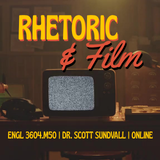 3604.M50 - Persuasive Writing: Rhetoric & Film | Dr. Scott Sundvall | Online
3604.M50 - Persuasive Writing: Rhetoric & Film | Dr. Scott Sundvall | Online
Contemporary persuasive writing is increasingly multimodal--meaning that, in addition
to alphabetic print, elements of image and sound are often incorporated into a given
composition. This course will develop persuasive writing skills by examining how film
and moving images work both rhetorically and discursively. Course materials will include
both texts and films.
ENGL 4619 - Document Design | Dr. Chloe Robertson | Online
Principles and techniques of creating online user help for software and usable web
sites; emphasis on needs of technical writers in professional development environment;
task analysis, information architecture, content management, single sourcing, visual
rhetoric, navigation, usability testing; technology tools intensive.
Honors & Internships:
ENGL 4640 - Internship in English | Rachel Cantrell | TBA
Experience with a local community partner requiring the assistance of English majors
with strong oral and written communication skills. Dependent upon availability. Visit our internships page for more information.
ENGL 4996 - Honors Thesis | Dr. Cristina Maria Cervone | TBA
Students engage in individual, intensive study of a unique problem or issue in English
Studies, culminating in a long piece (approx. 40 pages) of scholarly writing. Visit our English honors page for more information.
